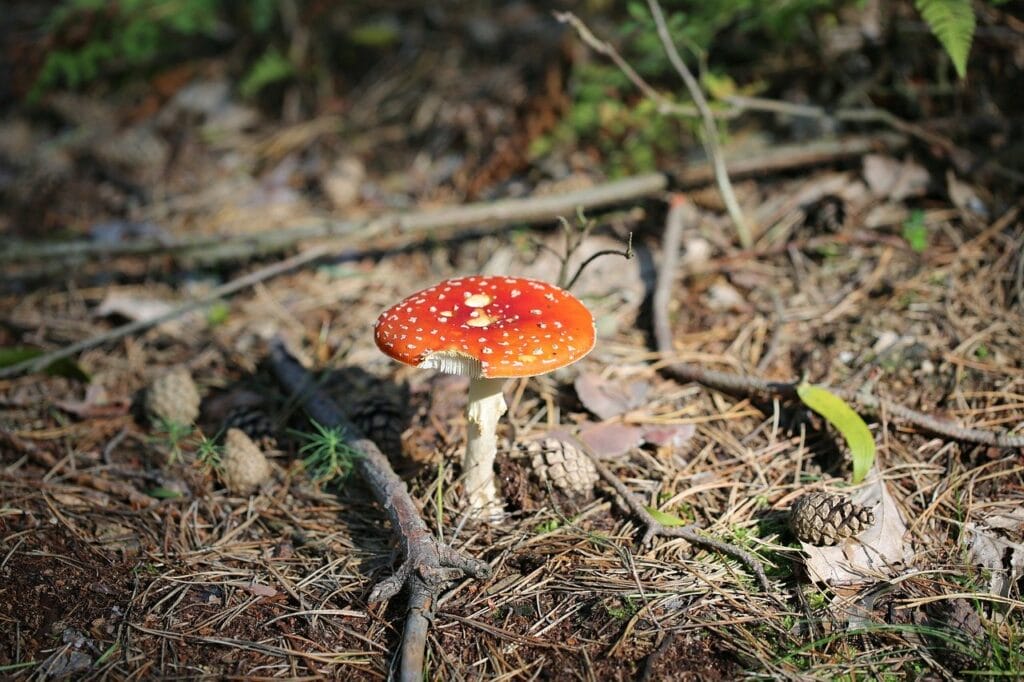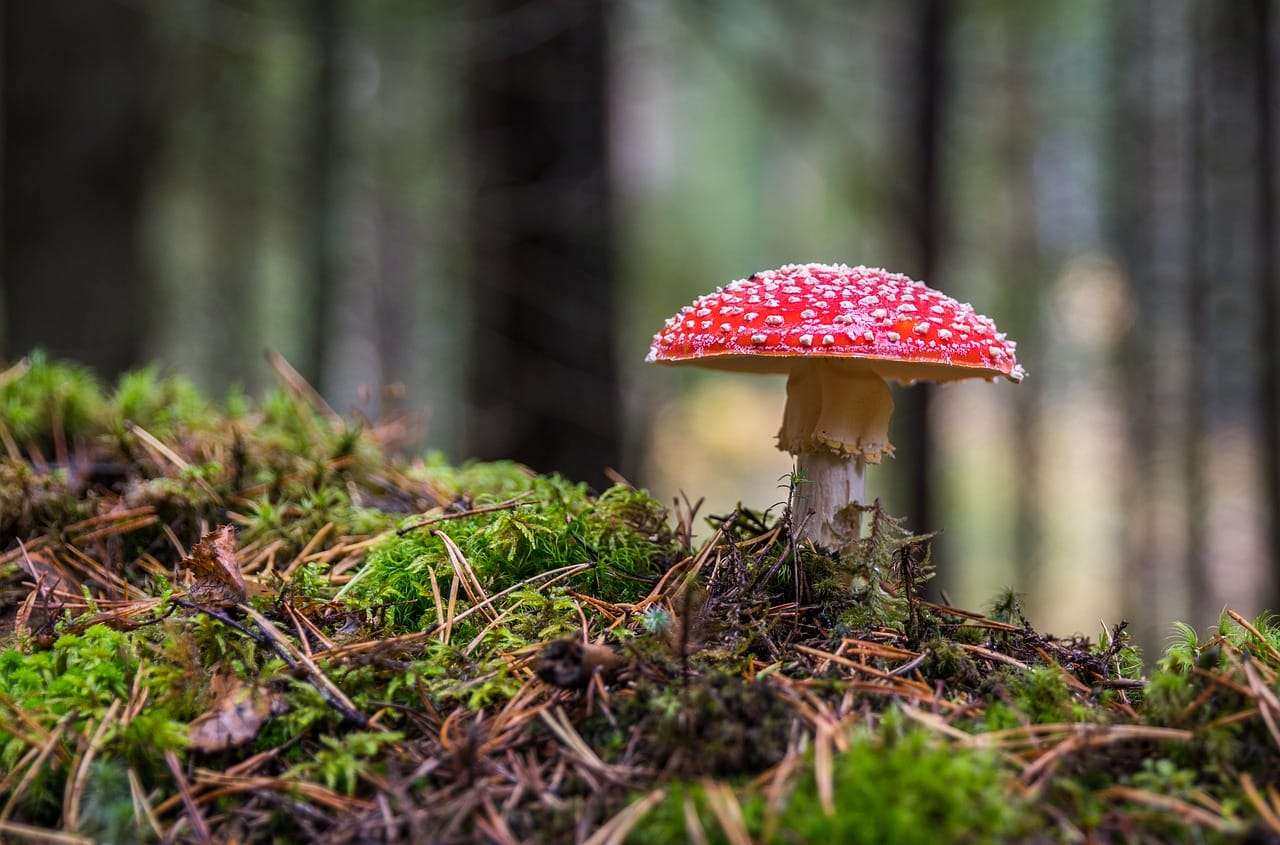For millennia, humanity has observed and intentionally utilized the psychedelic attributes found in certain plants and fungi.
Among these, fungi, especially magic mushrooms, are identified as the primary natural sources of psychedelic substances.
Psilocybin, a psychedelic compound extracted from mushrooms, has played a significant role throughout history, being incorporated into religious rituals and healing practices.
Several researchers are committed to exploring the possible health benefits of magic mushrooms online. Current studies have shed light on the effects of psilocybin mushrooms. These insights provide hope for many people, calling for a conversation about their integration into Canada’s healthcare system.
Key Takeaways:
- Magic mushrooms, containing the psychoactive substance psilocybin, hold potential for addressing mental health challenges in Canada.
- Psilocybin is safer and poses a lower risk of addiction and toxicity compared to opioids.
- Psilocybin has shown enduring effectiveness in treating depression, with effects that can persist for up to a year.

Getting to Know Psilocybin
Psilocybin, an indole-alkylamine (tryptamine) derived from magic mushrooms, has structural similarities with lysergic acid diethylamide (LSD). It induces hallucinogenic and euphoric experiences, likely owing to its interaction with serotonin (5-HT) receptors in the central nervous system.
Due to its interaction with serotonin receptors, high-quality magic mushrooms show a unique potential to help in addressing mental health disorders.
Mental Health and Opioid Crisis in Canada
Common Mental Health Disorders in Canada & Treatment Resistance
| 2012 | 2022 | |
| Major Depressive Episodes | 4.7% | 7.6% |
| Generalized anxiety disorder | 2.6% | 5.2% |
| Social phobia | 3.0% | 7.1% |
| Alcohol use disorder | 3.2% | 2.2% |
Over a third (36.6%) of individuals dealing with mood, anxiety, or substance use disorders indicated that their healthcare and mental health needs were not adequately addressed.
A scholarly article in the Canadian Journal of Psychiatry shed light on the attitudes towards seeking treatment among patients suffering from depression. The research involved a detailed analysis of 1282 patient records from 135 physicians. Out of these, 263 patients were found to have treatment-resistant depression (TRD), indicating a prevalence rate of 21.7% across Canada.
Opioid Crisis
Approximately 8 million Canadians, representing one in five, are battling chronic pain. Uncontrolled pain can negatively affect various facets of an individual’s life.
Healthcare professionals sometimes recommend opioids for managing pain. Opioids can provide benefits such as pain relief and improved functionality, but they also come with potential risks.
From January 2016 to March 2022, at least 30,843 deaths related to opioid toxicity were reported in Canada. The majority of these tragic occurrences took place early in 2021, with a startling 5,368 cases reported. It’s important to note that most of these incidents, over 88%, were concentrated in the provinces of British Columbia, Ontario, and Alberta.
For Major Depressive Episodes
In a study published in the Journal of Psychopharmacology, 27 individuals with a long-standing history of depression were selected. Most of these individuals had been suffering from depressive symptoms for nearly two years prior to the study. Traditional antidepressants had been used by 88% of these individuals, and 58% reported ongoing use of such medications during their depressive episodes.
The researchers observed significant reductions in depression following psilocybin treatment for all participants. They also noted that the severity of depression remained consistently low at one, three, six, and 12 months post-treatment.
For General Anxiety and Social Phobia
A case study featured in the Croatian Medical Journal in October 2021 examined HTML:
The narrative revolves around a
A solitary 16-year-old boy, struggling with severe anxiety, social isolation, and declining academic performance, turned to a mental health clinic for help. His challenges were exacerbated by a learning disability and a lack of motivation for schoolwork, which made group therapy seem overwhelming and ineffective to him.
Following three psilocybin sessions over a period of 18 months, significant improvements were noted. His anxiety was lessened, and he showed improved communication with his peers and teachers. He started to express his feelings more openly, actively engaged in group therapy, and enjoyed better interpersonal relationships.
Treatment for Alcohol Use Disorder
A recent clinical trial, detailed in a study released in JAMA Psychiatry on August 24, revealed the potential of coupling psilocybin with psychotherapy to treat alcohol use disorder. The study tracked the progress of 93 patients with this disorder over a period of 32 weeks.
Of the 48 individuals who underwent psilocybin-assisted therapy, an impressive reduction of 83% in alcohol consumption was observed within eight months of their initial dose, compared to a 51% decrease in the placebo group. Almost half of the individuals who received psilocybin ceased drinking completely.
Addressing the Opioid Crisis
Elena Argento, a postdoctoral fellow at the University of British Columbia and BC Centre on Substance Use, is exploring the therapeutic use of psychedelics.
Argento explains that psilocybin can help reduce addiction risks by affecting both neurobiology and psychology. She highlights the transformative experiences that psychedelics can evoke, characterized by profound feelings of awe and transcendence. These experiences often lead individuals to discover new meanings and goals in life, potentially catalyzing behavioral changes, especially in terms of addiction.
In a recent longitudinal study conducted by Argento and the BC Centre on Substance Use, the researchers found a significant reduction in the likelihood of continued daily illicit opioid use among individuals who had used psychedelics recently or within the past six months.
Argento’s 2018 study also suggested that psychedelic use could act as a protective factor against the link between prescription opioid use and suicide risk.
A separate study discovered connections between psilocybin use and a decreased risk of opioid use disorder. This earlier research pointed to a 40% drop in the risk of opioid misuse and a 27% reduction in the risk associated with opioid dependence over the
Psychedelic use has surged in the past year.
Psilocybin Must be Evaluated as Part of Canada’s Therapeutic Strategy by Health Canada and Other Regulatory Bodies
While Psilocybin is recognized for its potential to positively affect Canadians’ mental health, access to it remains challenging. Health Canada allows healthcare professionals to prescribe it via the Special Access Program. However, the stringent guidelines of the program present considerable hurdles for many professionals and patients.
Employing psilocybin-containing mushrooms therapeutically could revolutionize mental health care in Canada by offering potentially transformative benefits. Psilocybin therapy, an alternative to traditional and often less effective treatments like pharmaceuticals or opioid replacement therapy, could lead to profound and long-lasting effects.
Evidence indicates that psilocybin therapy could provide enduring benefits, potentially enabling patients to avoid spending on ineffective treatments. Moreover, research suggests that psilocybin is relatively safe – it has low toxicity, a minimal risk of misuse, and rare incidences of overdose.
How Can Psilocybin be Purchased Online?
If accessing psilocybin therapy proves challenging for Canadians, they can opt to buy magic mushrooms online to address their present circumstances. They have the opportunity to explore a range of magic mushroom products, from high-dose to microdose magic mushrooms.
High-dose mushrooms encompass various psychedelic mushrooms available in different forms, such as dried magic mushrooms, edibles, or beverages, consumed for their therapeutic and hallucinogenic effects.
Microdosing magic mushrooms involves products with small amounts of magic mushrooms. These products come in capsules, shroom edibles, or shroom tea. Buying shrooms online offers an alternate way to subtly experience the benefits of these mushrooms. Strongest Magic Mushroom Strain Canada exclusively provides premium magic mushrooms online, ensuring top quality.
Is Psilocybin a Fit for Canadian Healthcare?
Despite its recreational use, it’s crucial to note that psilocybin has a safer profile than opioids and other medications typically prescribed in healthcare.
There’s a growing body of evidence that highlights its potential benefits, similar to those of marijuana, in treating a range of mental health conditions. dimensions of reality.
From a health and wellness standpoint, magic mushrooms have traditionally been utilized as aids in mental health therapies and catalysts for personal development.
What could be the possible risks and adverse effects of magic mushrooms?
Magic mushrooms can trigger a range of effects, both beneficial and adverse. These could encompass hallucinations, distorted perception, and psychological shifts. On the flip side, they might lead to uncomfortable symptoms like nausea, dizziness, and in extreme cases, psychological distress. It’s crucial to handle magic mushrooms with care and reverence, comprehending the possible risks involved. It’s always prudent to consult a healthcare professional before initiating any new regimen that involves magic mushrooms.
Is it risk-free to purchase magic mushrooms online?
Purchasing magic mushrooms online can be secure, assuming that you select a trusted source. It’s vital to perform comprehensive research about the product, the brand, and the online dispensary prior to making a buying decision. Customer testimonials and ratings serve as valuable indicators of product quality and the trustworthiness of the service. Always opt for dispensaries that place a high value on customer safety and satisfaction and provide safe payment methods.
Is it feasible to cultivate magic mushrooms at home?
Yes, home cultivation of magic mushrooms is feasible and can be a rewarding endeavor. However, it necessitates a specific environment and a comprehensive understanding of the growth process. Numerous kits and guides are available online to aid you in your cultivation endeavor. Nevertheless, bear in mind that the legality of growing magic mushrooms varies by region, so ensure your actions are in compliance with local laws and regulations.
experiences. Within the realm of wellness, some individuals opt for a more measured consumption, taking small quantities of mushrooms to reap their benefits without inducing hallucinations.Articles That Might Interest You:





